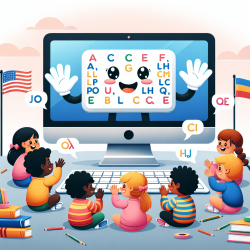As practitioners in the field of speech-language pathology, we are continually seeking evidence-based strategies to enhance our therapeutic outcomes. A recent study titled "Improving Reading Skills Using a Computerized Phonological Training Program in Early Readers with Reading Difficulties" provides compelling data on the effectiveness of computerized phonological training for young readers facing challenges. This blog will delve into the key findings of the study and offer practical applications for improving reading skills in early readers.
The study involved 32 children with reading difficulties who were divided into two intervention groups: one group followed a computerized intensive remediation strategy (RDIR), while the other received traditional school-based remediation (RDOR). A control group of 24 normal readers was also included. The results were telling: children in the RDIR group showed significantly greater improvements in reading performance compared to those in the RDOR group.
Key Findings
- Enhanced Reading Performance: Both intervention groups showed improvements, but the RDIR group had a more substantial increase in reading fluency and accuracy.
- Phonological Awareness: Intensive phonological training proved more effective in enhancing phonemic awareness, decoding, and reading fluency.
- Speed and Accuracy: The RDIR group outperformed the RDOR group in speed reading of words, pseudowords, and text measures of reading accuracy.
Practical Applications
To implement these findings in your practice, consider the following steps:
- Adopt Computerized Phonological Training: Integrate programs like the "Binding Method" into your therapy sessions to provide intensive, personalized phonological training.
- Focus on Early Intervention: Early and intensive intervention (ages 6-7) yields better outcomes in reading fluency and accuracy.
- Utilize Data-Driven Decisions: Regularly assess reading performance to tailor interventions and track progress.
In conclusion, the study underscores the importance of early, intensive, and computerized phonological training in improving reading skills in children with reading difficulties. By incorporating these evidence-based strategies, practitioners can significantly enhance their therapeutic outcomes and support children in overcoming reading challenges.
To read the original research paper, please follow this link: Improving Reading Skills Using a Computerized Phonological Training Program in Early Readers with Reading Difficulties.










